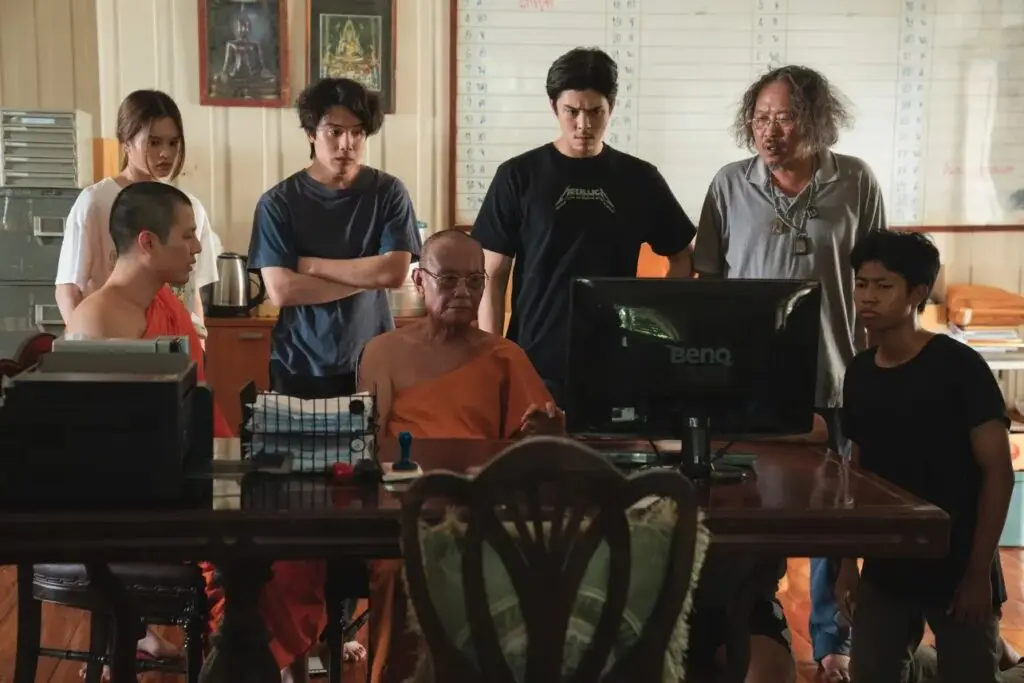Summary
The Believers has a dynamite premise that it can’t quite capitalize on, leading to a needless convoluted and ultimately unsatisfying back half.
There’s an old viewpoint that the Roman Empire never ended, it simply became a church. And while an obvious oversimplification, the point it’s making is clear – all that wealth and influence had to go somewhere, and the best place to hide it was under the Vatican. All of this is to say something that the Thai Netflix drama The Believers also says. Religion has always been for profit.
It’s a good idea for a show, this. You can quibble about the execution – and I will – but the underlying idea is smart. Three young entrepreneurs rack up some bad debts to the wrong people and take over a struggling Buddhist temple to drum up the dough. That’s what you call cutting out the middleman. It isn’t about pious people slowly discovering that the veneer of altruism always obscures a cash-grab, but about enterprising people who see religion for what it is – a way to make money.
A Brilliant Premise Hides Many Flaws
Having only just reviewed Testament: The Story of Moses, I don’t want to become a broken record. But religious people do tend to be easy marks. They’re good for a tithe. And this is what Win (Teeradon Supapunpinyo), Game (Pachara Chirathivat), and Dear (Achiraya Nitibhon) figure out when their NFT business goes belly-up. They can take a struggling temple, modernize it, and sell it to a hipper demo. The money prints itself.
Brilliance of this premise aside, I’m not sure the early pace of The Believers is kind to it. Getting here from the cryptocurrency stuff is a bit confounding. The NFT game rewards users with cryptocurrency that keeps, for some reason, exploding in value, but when the system is hacked and a code is inputted to drain the currency’s value by selling it off in bulk, other token-holders see the depreciation and bail. It’s easy enough to understand that the guys start out raking it in and end up broke overnight, indebted to the people they borrowed the start-up money from in the first place, but it’s also a bit thinly explained to say the crux of the narrative hangs on it.
The Intersection Between Religion and Profit
But nevertheless. It’s difficult to deny that how the show approaches the intersection of religion and profit is the real appeal, and it does make for a novel exploration of how peoples’ greatest source of succor is also invariably trying to rip them off. The opportunistic leads, who aren’t bad guys but aren’t above pulling the wool over peoples’ eyes for a few quid, quickly become relatable because they never see the temple as anything but a business opportunity. These aren’t televangelists flying around in private jets blaming natural disasters on gay people; they’re sharp entrepreneurs who recognize the whole thing’s a scam.
Writer-director Wattanapong Wongwan provides decent justifications for each of them, too. Win is from a rural background and wants to exceed his circumstances; Game has seen his dad and sister work hard for peanuts and believes, rightly, there’s an injustice in that; Dear is seeking fatherly approval. These are, fundamentally, kids.
This is why the religious economy stuff is so fascinating and why one can’t help but be frustrated when The Believers bogs it down with other subplots that pull focus away. As things progress across the nine episodes – which is at least a couple too many – things get increasingly dark and complex, and by extension quite off-putting, at least compared to earlier on. The juice isn’t worth the squeeze by the time we reach a finale which has left itself with more to do than it reasonably can. A second season, anyone? With every show angling for one these days, I’d be surprised.
Fair Warning
Also, fair warning – the dub doesn’t match the subtitles to an alarming degree. Pick one or the other, ideally the subtitles, but be prepared that they’re telling largely different stories. On that note, there’s some very culturally specific Thai patter and details that might be lost on a Western audience, at least one not overly familiar with Thai media.
The bottom line is that this is a great idea for a show, but not a great show. It’s worth a look for its charm, the novelty of the premise, and some of the more surprising directions it goes in, but it’s also worth approaching with caution because of… well, some of the more surprising directions it goes in.
More on The Believers:




